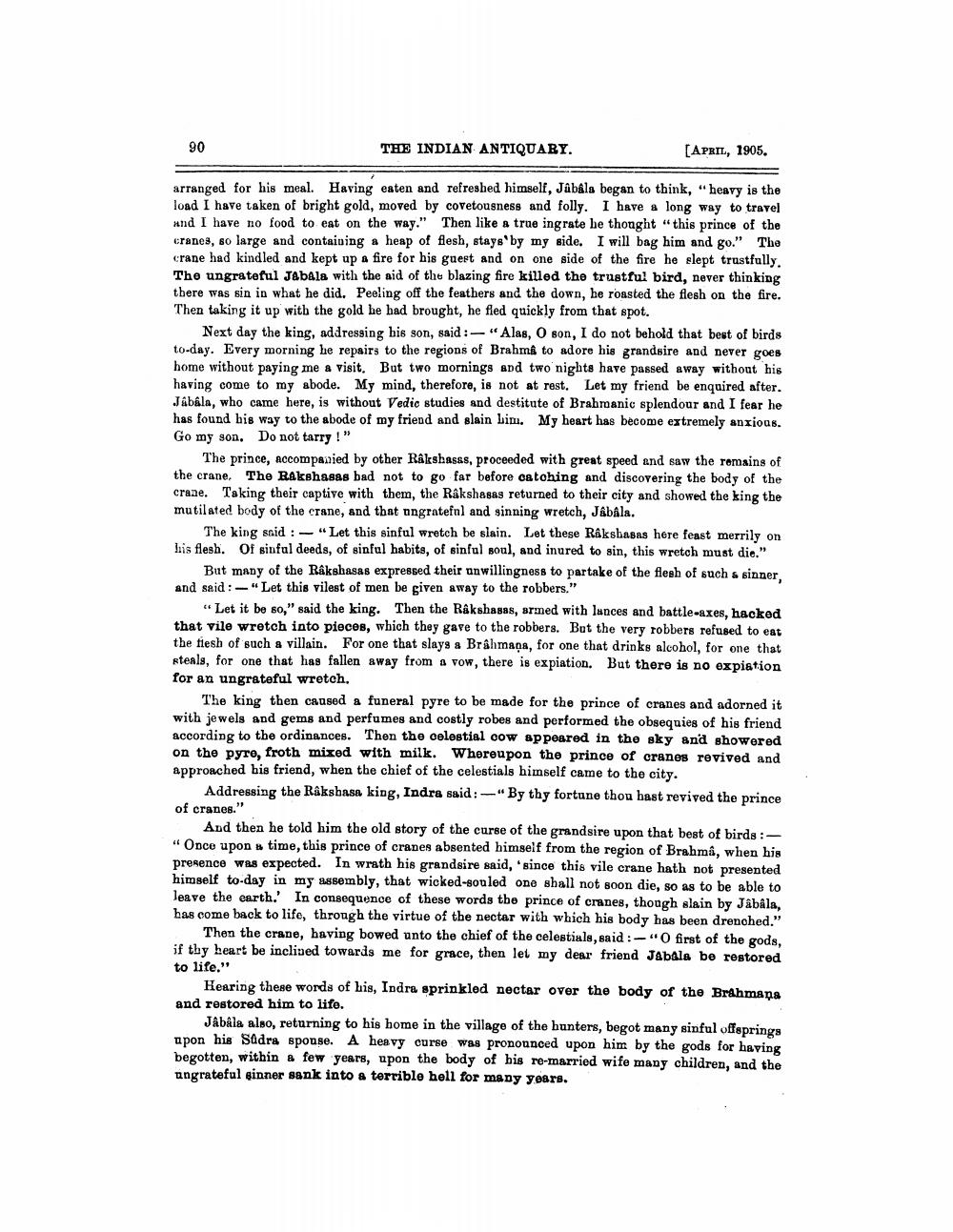________________
90
THE INDIAN ANTIQUABY.
[APRIL, 1905.
arranged for his meal. Having eaten and refreshed himself, Jabála began to think, "heavy is the load I have taken of bright gold, moved by covetousness and folly. I have a long way to travel and I have no food to eat on the way." Then like a true ingrate he thought "this prince of the cranes, so large and containing a heap of flesh, stays by my side. I will bag him and go." The crane had kindled and kept up a fire for his guest and on one side of the fire he slept trustfully. The ungrateful Jabala with the aid of the blazing fire killed the trustful bird, never thinking there was sin in what he did. Peeling off the feathers and the down, he roasted the flesh on the fire. Then taking it up with the gold he had brought, he fled quickly from that spot.
Next day the king, addressing his son, said :-"Alas, O son, I do not behold that best of birds to-day. Every morning he repairs to the regions of Brahmê to adore his grandsire and never goes home without paying me a visit. But two mornings and two nights have passed away without his having come to my abode. My mind, therefore, is not at rest. Let my friend be enquired after. Jabala, who came here, is without Vedic studies and destitute of Brahmanic splendour and I fear he has found his way to the abode of my friend and slain Lim. My heart has become extremely anxious. Go my son. Do not tarry!"
The prince, accompanied by other Rakshasas, proceeded with great speed and saw the remains of the crane, The RAkshasas bad not to go far before catching and discovering the body of the crane. Taking their captive with them, the Rakshagas returned to their city and showed the king the mutilated body of the crane, and that ongrateful and sinning wretch, Jabala.
The king said : - "Let this sinful wretch be slain. Let these Rakshabas here feast merrily on liis flesh. Of sinful deeds, of sinful habits, of sinful soul, and inured to sin, this wretch must die."
But many of the Rakshasas expressed their unwillingness to partake of the flesh of such a sinner, and said: - "Let this vilest of men be given away to the robbers."
Let it be so," said the king. Then the Rakshagas, armed with lunces and battle-exes, hackad that vile wretch into pieces, which they gave to the robbers. But the very robbers refused to eat the flesh of such a villain. For one that slays a Brahmağa, for one that drinks alcohol, for one that steals, for one that has fallen away from a vow, there is expiation. But there is no expiation for an ungrateful wretch.
The king then caused a funeral pyre to be made for the prince of cranes and adorned it with jewels and gems and perfumes and costly robes and performed the obsequies of his friend according to the ordinances. Then the celestial cow appeared in the sky and showered on the pyro, froth mixed with milk. Whereupon the prince of cranes revived and approached his friend, when the chief of the celestials himself came to the city.
Addressing the Rakshasa king, Indra said: - By thy fortune thou hast revived the prince of cranes."
And then he told him the old story of the curse of the grandsire upon that best of birds :"Once upon time, this prince of cranes absented himself from the region of Brahma, when his presence was expected. In wrath his grandsire said, since this vile crane hath not presented himself today in my assembly, that wicked-souled one shall not soon die, so as to be able to leave the earth.' In consequence of these words the prince of cranes, though slain by Jábâla, has come back to life, through the virtue of the nectar with which his body has been drenched."
Then the crane, having bowed unto the chief of the celestials, said :-"O first of the gods, if thy heart be inclined towards me for grace, then let my dear friend Jabala be restored to life."
Hearing these words of his, Indra sprinkled nectar over the body of the Brahmana and restored him to life.
Jabála also, returning to his home in the village of the hunters, begot many sinful offsprings apon his Sadra spouse. A heavy curse was pronounced upon him by the gods for having begotten, within a few years, upon the body of his re-married wife many children, and the ungrateful ginner sank into a terrible hell for many years.




